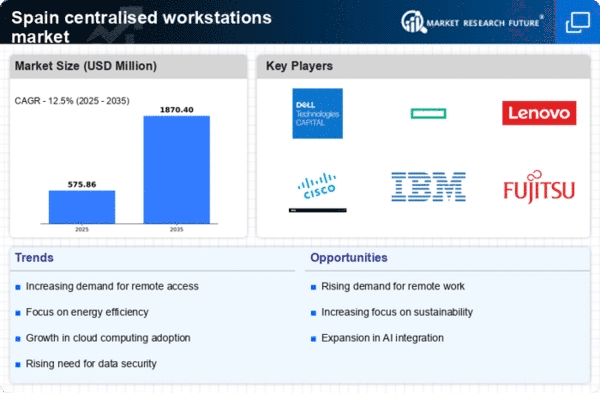Shift Towards Sustainable IT Practices
In Spain, the centralised workstations market is witnessing a shift towards sustainable IT practices. Organizations are increasingly prioritizing environmentally friendly solutions, leading to a growing interest in energy-efficient centralised workstations. Recent statistics reveal that the market has experienced a 10% increase in the adoption of energy-efficient technologies. By centralizing computing resources, companies can reduce their overall energy consumption and carbon footprint. This trend aligns with broader sustainability goals and reflects a commitment to responsible resource management. As businesses strive to enhance their environmental performance, the demand for sustainable centralised workstations is expected to rise, contributing to the overall growth of the market.
Growing Demand for Remote Work Solutions
The centralised workstations market in Spain is experiencing a notable surge in demand for remote work solutions. As organizations increasingly adopt flexible work arrangements, the need for centralized systems that facilitate remote access to resources becomes paramount. This shift is reflected in a reported 30% increase in the deployment of centralised workstations over the past year. Companies are recognizing the advantages of centralized management, which not only streamlines operations but also enhances collaboration among remote teams. The ability to access powerful computing resources from various locations is driving investments in this market, as businesses seek to maintain productivity and efficiency in a hybrid work environment. Consequently, the centralised workstations market is poised for continued growth as more enterprises prioritize remote work capabilities.
Increased Regulatory Compliance Requirements
The centralised workstations market in Spain is also shaped by increased regulatory compliance requirements. Organizations are facing heightened scrutiny regarding data protection and privacy, necessitating the implementation of robust centralized systems that ensure compliance with regulations such as GDPR. This has led to a 15% rise in the adoption of centralised workstations that incorporate advanced security features and compliance tools. By centralizing data management and access controls, businesses can better safeguard sensitive information and demonstrate adherence to regulatory standards. As compliance becomes a critical concern for organizations, the demand for centralised workstations that facilitate regulatory compliance is likely to grow, further propelling the market forward.
Rising Focus on Data Management and Analytics
In Spain, the centralised workstations market is significantly influenced by the rising focus on data management and analytics. Organizations are increasingly recognizing the value of centralized systems that can efficiently handle large volumes of data. This trend is underscored by a 25% increase in investments in data analytics tools integrated with centralised workstations. By centralizing data processing and analysis, companies can derive actionable insights that drive strategic decision-making. Furthermore, the integration of advanced analytics capabilities into centralised workstations enhances operational efficiency and fosters innovation. As businesses strive to leverage data for competitive advantage, the demand for sophisticated centralised workstations equipped with robust data management features is likely to escalate.
Advancements in Hardware and Software Technologies
The centralised workstations market in Spain is benefiting from rapid advancements in hardware and software technologies. Innovations in processing power, storage solutions, and virtualization technologies are enabling organizations to deploy more efficient and powerful centralised workstations. Recent data indicates that the market has seen a 20% increase in the adoption of high-performance computing solutions. These advancements not only enhance the performance of centralised workstations but also improve their scalability and flexibility. As businesses seek to optimize their IT infrastructure, the integration of cutting-edge technologies into centralised workstations is becoming increasingly prevalent. This trend is expected to drive further growth in the market as organizations invest in state-of-the-art solutions to meet their evolving needs.
















